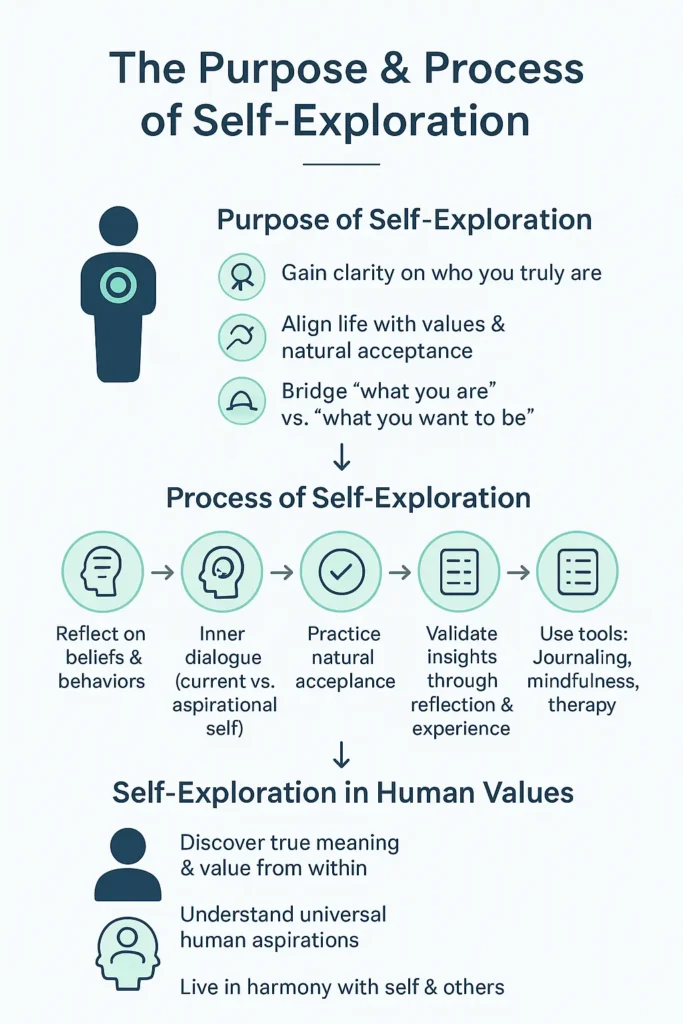Self-exploration is a transformative practice that helps individuals uncover their values, motives, and true desires, guiding them toward greater clarity and purpose in life. Below is an in-depth article with comprehensive insights, actionable steps, and people-first guidance on self-exploration, addressing all the requested sub-topics.
What Is The Purpose of Self-Exploration? A Complete Guide
Self-exploration is a conscious journey of understanding and investigating one’s thoughts, emotions, values, and beliefs. It is essential for personal growth, mental well-being, and harmonious living. This guide dives deeply into what self-exploration means, its relevance in human values, actionable steps to begin, and answers to key questions for anyone ready to embark on this meaningful process.
What Is the Purpose of Self-Exploration?
The primary purpose of self-exploration is to gain clarity about who one truly is and what one genuinely values. It allows a person to resolve inner contradictions and move toward a life aligned with their natural acceptance, leading to fulfillment and inner harmony. Self-exploration bridges the gap between “what you are” and “what you want to be,” fostering authenticity and self-evolution.
Process of Self-Exploration
Self-exploration involves several thoughtful steps:
- Reflecting on your beliefs, values, and behaviors
- Engaging in inner dialogue between your present self and your aspirations
- Practicing natural acceptance (accepting your own truth unconditionally)
- Validating your insights through personal experience and focused reflection
Tools like journaling, mindfulness, or introspective therapy can help facilitate this process.
What Is Self-Exploration in Human Values?
In human values, self-exploration is the process of finding out what is truly valuable and meaningful by looking within, rather than relying solely on external validation. This approach helps individuals understand universal human aspirations—like happiness and prosperity—and enables them to live in harmony with themselves and others by aligning actions with authentic values.
Benefits of Self-Exploration
Engaging in self-exploration offers both personal and social advantages:
- Self-awareness: Better understanding of passions, behaviors, and emotional triggers
- Emotional intelligence: Improved ability to recognize, manage, and communicate emotions
- Authenticity and clarity: Ability to live a life in alignment with core values, reducing anxiety and confusion
- Resilience and self-acceptance: Nurturing compassion and confidence to face life challenges
- Better relationships: Enhanced empathy fosters healthier interpersonal connections
- Effective decision-making: Making informed choices in alignment with personal values
How to Start Self-Exploration
Here are practical steps to begin this journey:
- Set aside quiet time for regular self-reflection
- Ask yourself foundational questions about goals, values, and beliefs
- Practice mindfulness and observe your thoughts without judgment
- Use journals or worksheets to document insights and patterns
- Seek therapy or support if guidance is needed
- Accept the process is ongoing and be patient with yourself
Why Do We Need Self-Exploration Practice?
Self-exploration is vital because:
- It leads to self-improvement, inner harmony, and satisfaction
- Helps resolve contradictions between values and actions
- Facilitates growth by uncovering innate strengths and hidden aspirations
- Supports mental health and resilience, especially during transitions
Self-exploration is a deeply personal and practical process that supports authentic living and holistic well-being. Designed for real users, this guide provides not just theoretical insights but actionable steps, ensuring readers leave fully informed and ready to begin their journey.

Frequently Asked Questions
1. What is self-exploration?
Self-exploration is investigating one’s own thoughts, feelings, and motivations to understand oneself better.
2. Why is self-exploration important?
It brings clarity, self-awareness, emotional intelligence, and better decision-making.
3. How does self-exploration benefit relationships?
It helps set healthy boundaries, communicate needs, and foster empathy.
4. Is self-exploration a lifelong process?
Yes, it is ongoing and evolves as you grow and adapt.
5. What techniques can help with self-exploration?
Mindfulness, journaling, guided reflection, and therapy are beneficial.
6. Is self-exploration necessary for everyone?
While not mandatory, it greatly enhances personal well-being and growth.
7. Does self-exploration only involve positive experiences?
No, it may include facing uncomfortable truths and past traumas.
8. Can self-exploration lead to professional growth?
Absolutely. It clarifies strengths, goals, and motivates skill development.
9. What role do human values play in self-exploration?
They act as guiding principles for authentic living and fulfillment.
10. How do I know if my self-exploration is effective?
Look for increased self-acceptance, clarity, alignment of actions and values, and improved relationships.







